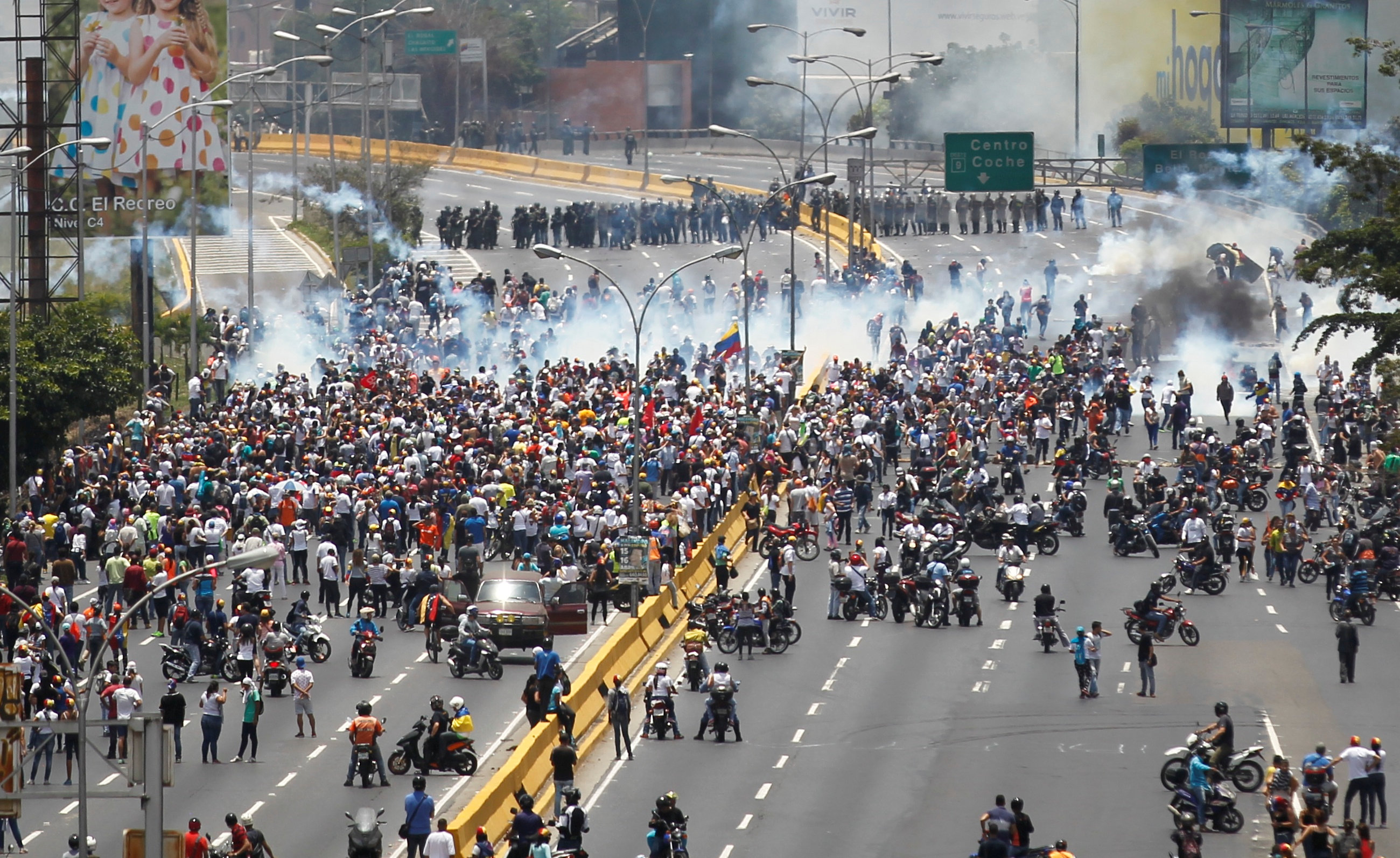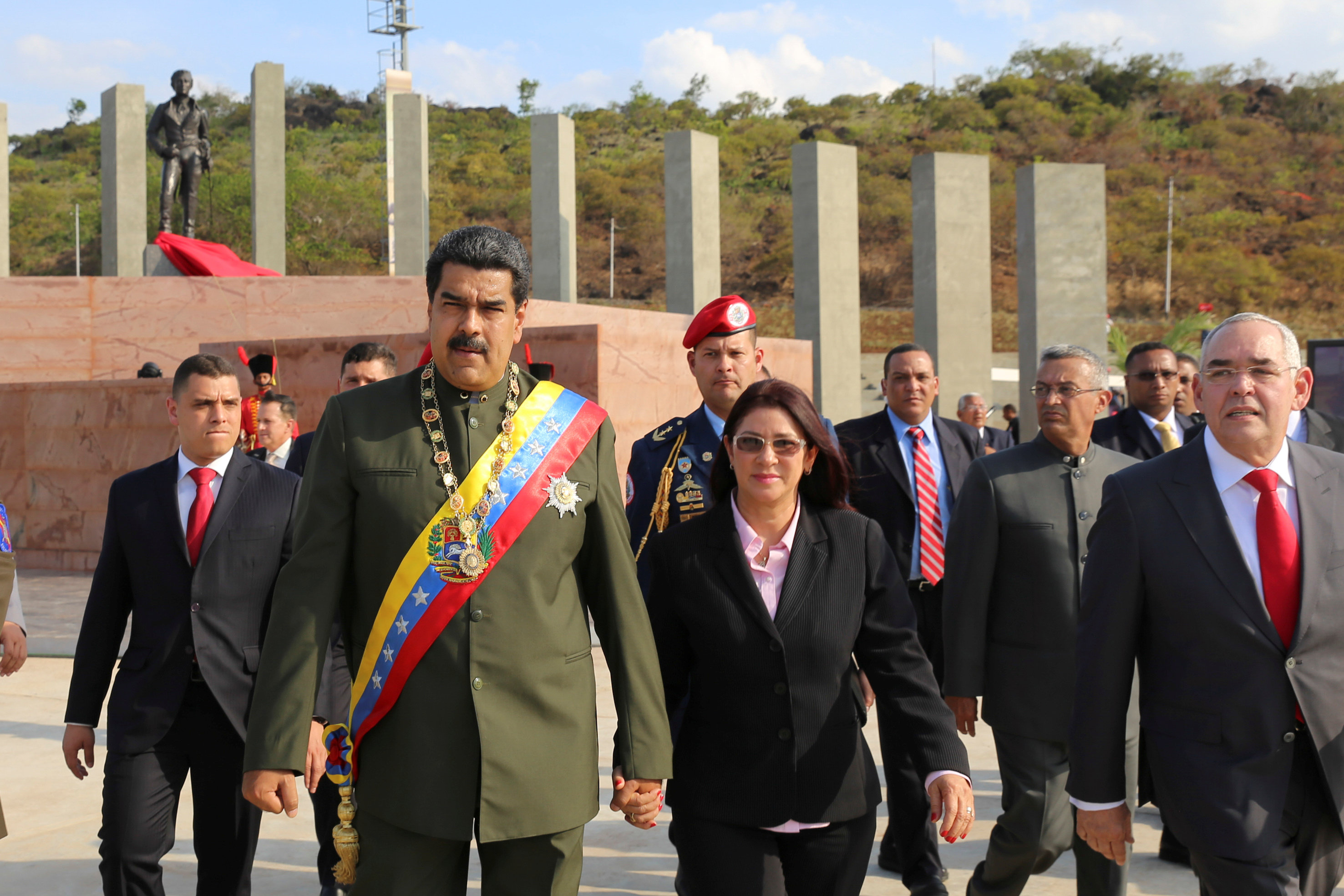
By Maria Ramirez and Alexandra Ulmer
SAN FELIX, Venezuela/CARACAS (Reuters) – Angry Venezuelans threw objects at President Nicolas Maduro during a rally on Tuesday, as protests mount against the unpopular leftist leader amid a brutal economic crisis and what critics say is his lurch into dictatorship.
State television footage showed a crowd mobbing the vehicle that Maduro was standing on as he waved goodbye at the end of a military event in San Felix, in the south-eastern state of Bolivar. Amid the commotion, people threw objects at Maduro, who was wearing a traditional Venezuelan suit and a yellow-blue-red presidential sash, while his bodyguards scrambled.
The state broadcaster then halted transmission.
In a separate video shared on social media, voices yelling “Damn you!” were heard as the vehicle apparently transporting Maduro, a former bus driver and union leader, tried to make its way through the crowd.
Five males, aged 15, 17, 18, 19 and 20, were arrested for throwing “sharp objects” against Maduro’s vehicle, according to a report by a local National Guard division seen by Reuters on Tuesday night.
Further details were not immediately available. The Information Ministry did not respond to a request for information, although Socialist Party officials tweeted that Maduro had been received by a cheering crowd in San Felix.
However, the opposition, which has been protesting in the last two weeks to demand early elections, pounced on the incident as evidence that Maduro is deeply despised amid food shortages and spiraling inflation.
“The DICTATOR only needs to leave Miraflores (presidential palace) to see how the people repudiate him!” opposition lawmaker Francisco Sucre, from the state of Bolivar, said on Twitter amid a flurry of commentary on social media.
“They cannot give a standing ovation to the man responsible for the worst humanitarian crisis in our history!” Sucre added.
The incident drew immediate parallels with last year, when authorities briefly rounded up more than 30 people on Margarita island for heckling Maduro, a rare sight given that the president’s appearances typically are carefully choreographed and show only cheering supporters wearing red shirts.
Videos published by activists at the time showed scores of people banging pots and pans and jeering Maduro during a visit to inspect state housing projects. Authorities later accused opponents of “manipulating” videos.

Venezuela’s President Nicolas Maduro (2nd L) in San Felix, Venezuela April 11, 2017. Miraflores Palace/Handout via REUTERS
TWO DEATHS
Venezuela’s opposition on Tuesday pilloried what it says is repression during anti-Maduro protests after authorities confirmed a second death in unrest in the last week.
The state prosecutor’s office said in a statement on Tuesday that a 20-year old man had been fatally shot in the neck on Monday night at a protest in the city of Valencia. Opposition lawmakers said the man, Daniel Queliz, was killed by security forces while he was protesting.
His death comes on the heels of the killing of 19-year-old Jairo Ortiz on the outskirts of Caracas on Thursday in the area of an opposition protest. A police officer has been arrested.
After years of protesting with little results, street action had ebbed until a Supreme Court decision in late March to assume the functions of the opposition-led congress sparked outcry, with condemnation at home and abroad.
The court quickly overturned the most controversial part of its decision. News that the national comptroller on Friday had banned high-profile opposition leader Henrique Capriles from office for 15 years drew broad criticism, too.
Venezuelans have been suffering food and medicine shortages for months, leading many to skip meals or go without crucial treatment.
Opposition leaders announced another round of protests in Venezuela’s more than 300 municipalities for Thursday, saying scattered demonstrations would stretch security forces thin.
Maduro says that under a veneer of pacifism, the opposition is actually encouraging violent protests in a bid to topple his government.
State officials via social media have shown images and videos of demonstrators vandalizing public property and throwing rocks at police.
“Who is taking responsibility for damage to public property and persons?” Defense Minister Vladimir Padrino said on Twitter, posting pictures of demonstrators kicking police officers and breaking into an office of the Supreme Court. “What is their agenda? Terrorism, chaos, death?”
Most of the protesters are peaceful and say street action is their only option after authorities last year blocked a recall referendum to remove Maduro. Local elections, due last year, have yet to be called.
Still, many Venezuelans are pessimistic that street protests will yield any change, while others abstain out of fear of violence or because they are too busy searching for food.
(Additional reporting by Brian Ellsworth and Diego Ore; Writing by Alexandra Ulmer; Editing by Lisa Shumaker and Leslie Adler)





